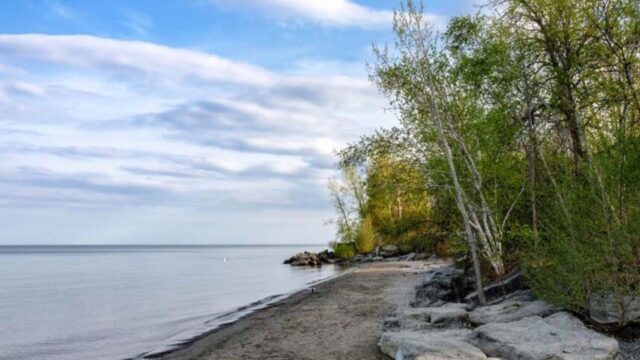Given that it is an election year, it would be easy to politicize efforts to introduce an environmental bill of rights in Manitoba, but that would be a mistake.
A strong, well-crafted bill of rights that recognizes Manitobans’ right to a healthy environment would go a long way toward strengthening and modernizing the province’s environmental laws. It’s a concept whose time has come, and one that should transcend political allegiances.
You have until February 1st to urge the Manitoba Legislature to introduce a strong environmental bill of rights.
It’s time to ensure that Manitoba protects, fulfills, and promotes your right to a healthy environment. Here are six reasons why:
1. Support sustainable prosperity
Canada’s natural environment is beginning to fray at the edges because of decades of neglect and exploitation. Our forests, oceans, prairies, rivers, lakes and the climate are all under increasing stress. In Manitoba, pollution in Lake Winnipeg and threats to groundwater from oil and gas pipelines and other industrial developments hit especially close to home because they expose water, one of our most precious resources, to unacceptable risk.
A bill of rights can help. International examples demonstrate jurisdictions that have laws recognizing the right to a healthy environment tend to perform better environmentally and economically than those that do not. Strong environmental standards spur innovation and new technologies, resulting in increased competitiveness and economic growth.
2. Promote better health
The World Health Organization and the Canadian Medical Association estimate tens of thousands of premature deaths and millions of illnesses are caused each year in Canada by air pollution, contaminated water and other environmental hazards. Children are particularly vulnerable to these health risks. By improving environmental performance, a bill of rights could help reduce preventable deaths and illnesses.
3. Increase government accountability
The active enforcement of our environmental laws should not depend upon the political will of the day. A bill of rights would give Manitobans strong, enforceable tools to hold government and polluters to account when they do not comply with our laws. Increasing public participation in environmental decision-making would allow communities to have a say in decisions that could impact their health and environment, fostering better relationships between communities and nearby facilities, and resulting in laws, regulations and policies with more legitimacy.
4. Prevent environmental rollbacks
Having a bill of rights would make Manitoba a visionary environmental leader. Recognition of the right to a healthy environment has led to the emergence of a new legal principle in some countries called “non-regression,” which means future governments can only improve — not weaken — environmental protections. We’ve seen recent examples of such rollbacks to vital laws at the federal level, and in other provinces.
5. Greater respect for indigenous law
From coast to coast to coast, the long-standing legal traditions of indigenous peoples recognize the idea of a living Earth, along with rights and responsibilities that govern the relationships between humans and the natural world. Provincial legislation recognizing we all have a right to a healthy environment and a responsibility to act as stewards for future generations would be consistent with these fundamental indigenous cultural and legal tenets. A Manitoba environmental bill of rights should also recognize the special relationship that indigenous peoples have with the Earth and other living things, and explicitly clarify that the statute does not take away from aboriginal or treaty rights protected by our constitution.
6. Advance environmental justice
The burden of pollution is not fairly distributed in Canada — or Manitoba. Poor communities and indigenous communities bear a disproportionately high burden and often lack access to certain environmental benefits, such as clean drinking water and public green space. An environmental bill of rights that recognizes the right of all Manitobans to live in a healthy environment would equip communities who bear an unfair pollution burden with much stronger tools to assist their fight for environmental justice.
Manitobans have until Feb. 1 to provide comments to the Conservation and Water Stewardship department about the government’s proposal to introduce the bill of rights. In crafting a made-in-Manitoba statute, the government must continue to consult with people, including indigenous communities in particular.
National polling indicates emphatic public support for environmental rights. Indeed, several communities and municipalities including The Pas have passed declarations supporting the right to a healthy environment.
With Manitobans headed to the polls this spring, politicians of all stripes would be wise to get on board. Standing up for the right to have a healthy environment isn’t a political statement, it is a basic acknowledgement of the deep connection between the quality of our environment and our human right to life, liberty, and dignity.
Kaitlyn Mitchell is a Winnipeg-born lawyer with Ecojustice, Canada’s only national environmental law charity. Ecojustice and the David Suzuki Foundation are partners in the Blue Dot movement, a national grassroots campaign to advance the legal protection of all Canadians’ right to live in a healthy environment. Dr. David R. Boyd is an adjunct professor of Resource and Environmental Management at Simon Fraser University and author of The Right to a Healthy Environment: Revitalizing Canada’s Constitution.
This piece was originally published on January 19, 2016 in the Winnipeg Free Press.



